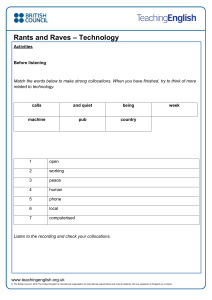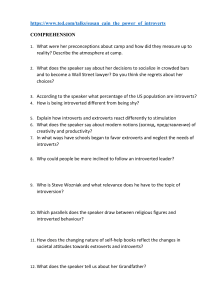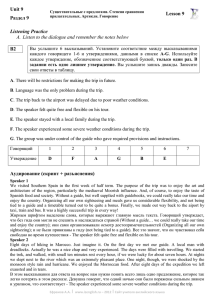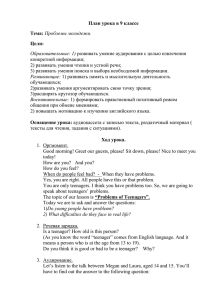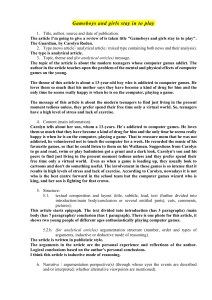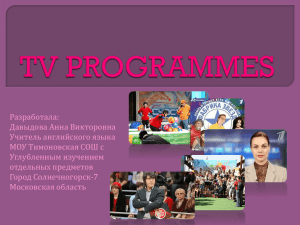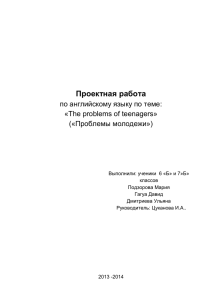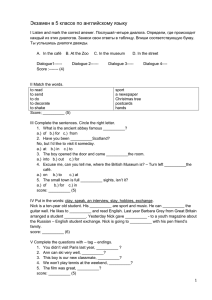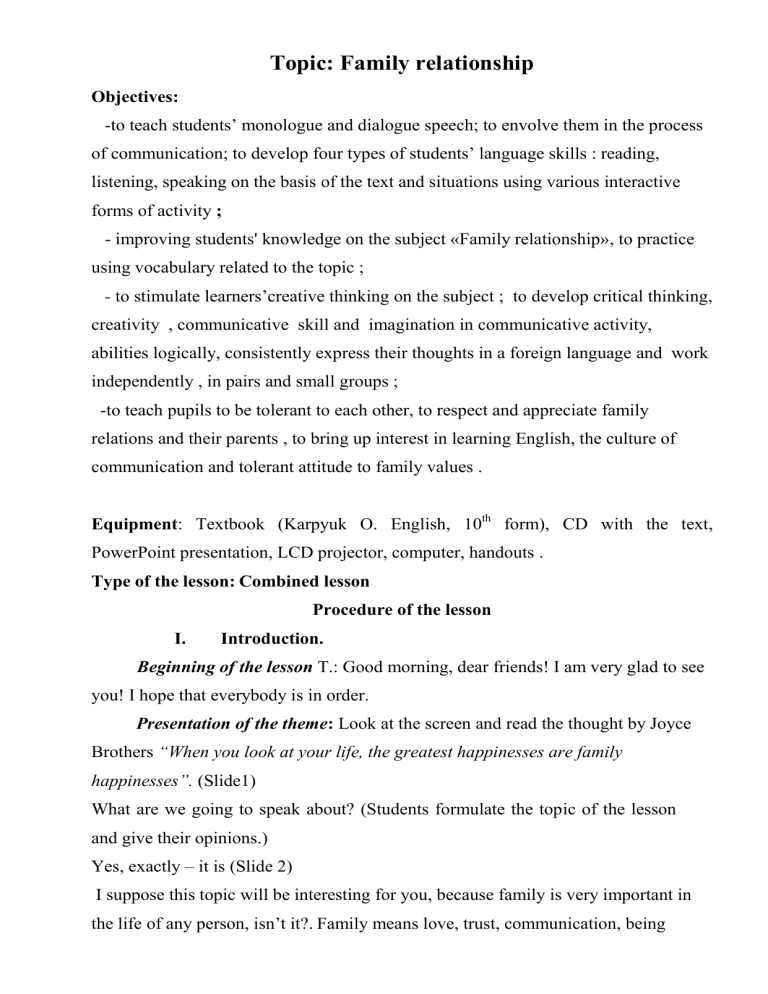
Topic: Family relationship Objectives: -to teach students’ monologue and dialogue speech; to envolve them in the process of communication; to develop four types of students’ language skills : reading, listening, speaking on the basis of the text and situations using various interactive forms of activity ; - improving students' knowledge on the subject «Family relationship», to practice using vocabulary related to the topic ; - to stimulate learners’creative thinking on the subject ; to develop critical thinking, creativity , communicative skill and imagination in communicative activity, abilities logically, consistently express their thoughts in a foreign language and work independently , in pairs and small groups ; -to teach pupils to be tolerant to each other, to respect and appreciate family relations and their parents , to bring up interest in learning English, the culture of communication and tolerant attitude to family values . Equipment: Textbook (Karpyuk O. English, 10th form), CD with the text, PowerPoint presentation, LCD projector, computer, handouts . Type of the lesson: Combined lesson Procedure of the lesson I. Introduction. Beginning of the lesson T.: Good morning, dear friends! I am very glad to see you! I hope that everybody is in order. Presentation of the theme: Look at the screen and read the thought by Joyce Brothers “When you look at your life, the greatest happinesses are family happinesses”. (Slide1) What are we going to speak about? (Students formulate the topic of the lesson and give their opinions.) Yes, exactly – it is (Slide 2) I suppose this topic will be interesting for you, because family is very important in the life of any person, isn’t it?. Family means love, trust, communication, being together, sharing, understanding, listening, caring and space.Family values are deservedly praised (extolled). A well-functioning family is a microcosm of society as it should work.(Slide 3) So, today we’ll learn more about relationship between children and parents, have a discussion, learn some new vocabulary, do some exercises to remember them better, read a text, listen to some teenagers’ stories about different families. At the end of the lesson you are to check your family relations with the help of psychologist’s questionnaire and share your ideas. II. Pronunciation drill. T. Listen to the short poem and then repeat it in groups When life gives you lemons – make lemonade If life gives you strict teachers – thank them. If life gives you strict parents – obey them. (Slide 4) P1 – P2 – P3-P4 III. Warming –up T. Our subject is Family relationship. Leo ToIstoy wrote in his famous book “Anna Karenina”: “All happy families resemble one another, each unhappy family is unhappy in its own way.”(Slide 5) What is a happy family in your opinion? (One student from the group - students devided into 4 groups) P1 – P2-P3-P4 What does the home mean to you? ( The students work in groups. The development of monologue speech.) IV. Speaking T. OK. So, Family is a group of people living in the same house. Some families are large,others are small. Is it good or bad to grow up in a large family? Now each of your groups has to share the ideas according to your individual task ! Don’t forget to use the conversational formula: I strongly believe that I am sure I can’t agree with … I can’t but agree … It wasn’t mentioned that … On the contrary! T.: Be emotional! 1-st group – You speak about the advantage of being an only child in the family. 2-nd group – You speak about the disadvantages of being an only child in the family. 3-d group- Do you think its better to be the older or the younger child in the family with two children? 4-th group- Does a child position in the family have an influence on his/her personality? (Slide 6) V. Reading “What affects our personality?” (page 4-5 ) а) Pre-reading activity T.: Now we are going to read a very interesting text. Its title is «What affects our personality?». What will it be about? What are your predictions? T.: There are some unknown words in the text. Let’s “get acquainted” with them to understand the text better.(p 6 Word File) –Slide 7 to affect jealous affectionate manipulative ambitious moody bossy responsible competitive selfish charming sociable envious spoilt imaginative sensitive T.: Let’s do some exercises to remember the vocabulary better! - Ex.5 p 6 (-Complete the sentences with the adjectives from the Word File. Consult a dictionary if necessary.) T.: Make up word combinations and sentences with the new words! Be original! b) While –reading activity T.: Now it is high time to listen to the text . Besides, you have the chance to read the text of exercise 2, pages 4-5! So, listen to it and deside in which paragraph (1-5) mentions: a) about the youngest children? b) about the children who have to look after their younger br others and sisters? c) about Tom Hughes? d) about the only children? e) about the most competitive children? T.: Read the article and answer the questions Which children are usually: 1. independent and sociable? 2. charming and affectionate? 3. quite self-confident and ambitious? 4. very organized and responsible? Agree or disagree with the sentences below! Correct the false statements! 1. Position in the family doesn’t influence on our personality. 2. The oldest children are usually self-confident people. 3. Middle children are usually independent but they don’t like being with people. 4. The middle children are often jelous of their brothers and sisters. 5. The youngest children often use their charm to get what they want. 6. The only child think of other people more than of themselves. (Slide 8) c) Post-reading activity T.: Look through the story and complete the chart with the personality adjectives in each colum Oldest children middle children (Slide 9) T.: Discuss the questions youngest children only child -Do you think the statements in the article are true for you? -Do you think they are true for your brothers and sisters or your friends? VI. Relaxation. Let us rest. T. Sit comfortably. Close your eyes. Breath in. Breath out. Let us suppose it is summer. You are lying on a sandy beach. The weather is fine. The light wind is blowing from the sea. The birds are signing. You are relaxing. You love your relatives, lyceum , friends. They love you too. Open your eyes. How do you feel? VII. Listening Listen to some speakers and fill in the table. Students listen to the teenagers’ stories and work with cards. (Supplement 1) - Look at the screen and compare your answers. Students check their works. (Slide 10) You have listened to some teenagers’ stories about different families. What do you think about relations in such families? Look at the cards and give your opinion using the table.( Students give their opinions. (Supplement 2) VIII. Questionnaire T. So, if a family is a group of people, there are some problems in any family. Not only the Russian writer Turgenev was interested in the problem of “fathers and sons” every generation has clashed face to face over such a problem. The flash of the conflict usually takes place, when the children are teenagers. Psychologists can clarify some questions or problems and help people to understand their reasons and how to solve them. Teenagers often have some misunderstandings in communication with their parents. I hope this test will help you to clear up and maybe think over the relationships with your parents. Look at the screen and attention, please. 1. What would you do if your parents were angry with you because of your bad behavior at home? a) I’d think over this problem. Maybe I have to correct my actions. b) I wouldn’t worry because parents are often displeased by their children. 2. What would you do if you had problems with your friends? a) I’d ask my mum for advice. She is understanding, attentive and tactful. b) I’d clear up this situation by myself because the adults often don’t understand teenagers’ problems. 3. How would you spend a big sum of money if you won it in a lottery? a) for my future education. b) for entertainment as my parents are going to pay for my education. 4. What would you do if your parents didn’t let you go out late? a) I’d promise to be very careful and phone them very often. b) I’d say that I am not a little child and I want to be with my friends when I want. 5. You and your parents have different opinions on some questions. Would you agree with them if they tried to change your mind? a) I’d prefer to have my own point of view but my parents can give me a good advice that’s why I consider their opinion. b) I’d have on my way because I know better what I want and what to do. The results of the test. Psychologist: Let’s sum up the results of the test. What variants have you chosen? (“A”) It means that there is mutual understanding and respect between you and your parents. You’re responsible and care of your parents’ feelings. It’s very important that your parents can trust you and support you in difficult situations. If you have chosen more variants “B” it means you are a little selfish and arrogant. You should think more about other people and take of your parents. And the relationships between you will be better. T.: I’d like to thank our psychologist for the consultation and I hope his advices will help you to solve some difficult situations. IX. Presentation . T.: Earlier some of our pupils have got a task to make the presentation according to our topic. You’ll see one of them. (The demonstration of the presentation is on the multimedia screen.) X. Reflection Interactive exercise "Imaginary microphone” T.: Before the end of our lesson I’d like to ask you some questions: 1) What are your impressions of our lesson? 2) What main questions have you found out for yourself? Teacher distributes flower petals to each group and asks pupils to express their ideas about the lesson. The representative of each group should deliver the results of their work in the lesson making “The English Flower” Possible ideas: We worked actively We liked the text We liked the lesson Today’s lesson We did interesting tasks We worked in groups It was interesting It was pleasant to work XI. Home Assignment Individual tasks 1) What phrases would you choose to support your children, if you were their parents? 2) You have quarreled with your parents. What phrases would you choose to solve this problem? 3) Make up a short dialogue between you and your parents. The problem is “Bad marks at school because of going in for sport, dancing, etc”. 4) Make up a short dialogue on the situation: You live in an extended family and you like it. But your friend doesn’t enjoy living with his family and wants to leave his home. Try to persuade him not to do it. Say that everything is not so bad as he might think. Remember that When you look at your life, the greatest happiness is family happiness. You don't choose your family. They are God's gift to you, as you are to them. Dialogue. Your friend: (Расскажи о своих планах) You know, I’m going to …. You: (вырази свое отношение и спроси о причинах) You don’t say so! In my opinion …. Why ….? Your friend: (объясни причины своего решения) I hate …. I don’t like …. You: (попроси объяснить одну из причин более детально) Could you explain why you … Your friend: (расскажи, что тебе больше всего не нравиться в отношениях, приведи примеры) My …. is always (do)ing …. You: (предположи возможные причины почему его семья так себя ведет) They (he, she) might be … Perhaps they ….. Your friend: (Вырази сомнение) I don’t really think that …. You: (Расскажи о своей ситуации, как вы решаете проблемы): As for me … . In our family … Your friend: (Закончи разговор) …. 5. Read the text “Modern family” (Supplement 3) and answer the questions. 6.to write a composition “An Ideal Family As I See It.” XII. Summing-up Suming up our lesson I think we all have come to the conclusion that family relationship plays a great role in people’s life. I enjoyed the way you worked at the lesson. You were active and smart. Your marks are… because… The lesson is over! Bye! Texts for listening Speaker 1 My parents both come from large families. Our family is large too. I have a lot of siblings. I get on well with them. We have lots of family celebrations and often share Sunday lunch with our relatives. Speaker 2 I am an only child in my family. I don’t see my parents as much as I would like, as they work long hours that’s why our relations are not so good. Sometimes I don’t obey my parents and I often argue with them. Speaker 3 My parents are in divorce, so my brother and I live with our mum. But we spend most weekends at our father’s place, as our parents think it is important to bring up children together. Our mother gives us moral support and our father always gives us a good advice. Speaker 4 In our family three generations live under one roof, but I think it is great. My parents help me when I have problems. I take care of my grandparents. We discuss and solve family problems together. Supplement 1 A. The speaker is close to all the members of the family and they support each other. B. The speaker has parents which both want to bring up their children. C. The speaker is from a large family and they have some family traditions. D. The speaker has family problems and misunderstanding with parents. Speaker 1 2 3 4 Statement (a letter) Supplement 2 In my opinion From my point of view important it is necessary wonderful It seems to me not easy There is no doubt difficult . . . Supplement 3 A Modern Family Family is very important in our life. Families give us a sense of belonging and a sense of tradition, families give us strength and purpose. The things we need most deeply in our lives – love, communication, respect and good relations – have their beginnings in the family. Many single adult men and women today are waiting longer to get married. Some men and women marry and start their family life later because they want to graduate from a university or college, others want to become more established in their chosen profession. Couples are also waiting longer before they have children. Today an average household contains only two or three people. In many families both parents work outside the home. Most families include members of just two generations: parents and their children. Nowadays people very often talk about a “generation gap’. But there are a lot of stable and happy families. They spend a lot of time together. When problems arise, such families work together to solve them. Men and women work hard to make their families successful. - What is more important for young people to have a good career or to start family life? - How do husbands and wives share their domestic (household) chores? - What makes families stable and happy?
